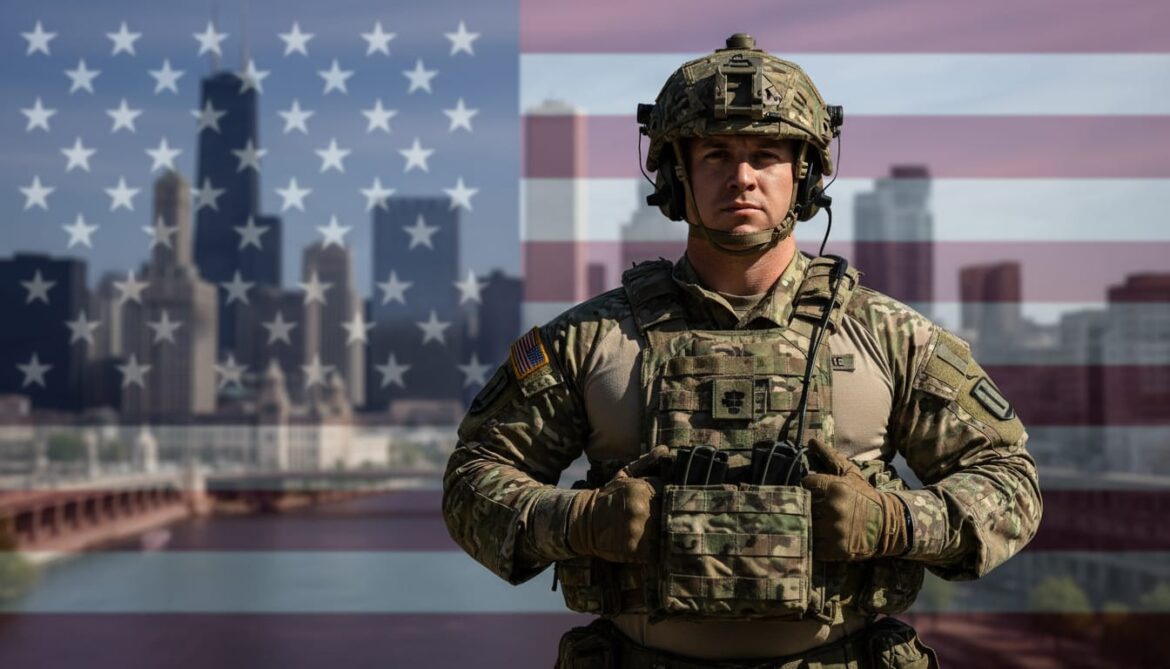National Guard Deployment for Peace
In a time of escalating urban unrest, President Donald Trump’s decision to deploy National Guard troops to Portland and Chicago stands as a decisive step toward restoring law and order. As of October 2025, protests in these cities have intensified, with reports of violence, property damage, and threats to federal assets prompting federal intervention. This Trump National Guard deployment, while sparking legal battles from local Democratic leaders, reflects a commitment to safeguarding communities when local authorities falter. Critics decry it as overreach, but supporters hail it as essential leadership. In this comprehensive analysis, we explore the background, benefits, legal foundations, and broader implications of the Trump National Guard deployment to Portland and Chicago, demonstrating why this is the responsible path forward.
The unrest traces back to ongoing demonstrations against federal policies, including immigration enforcement and economic measures. In Portland, nightly clashes have persisted for months, echoing 2020’s turbulent summer but amplified by current economic pressures. Chicago faces similar volatility near ICE facilities, where crowds have surged, leading to arrests and injuries. Trump’s administration argues that without federal aid, these situations risk spiraling into widespread anarchy, endangering lives and livelihoods. By invoking presidential authority under the Insurrection Act and other statutes, the Trump National Guard deployment aims to de-escalate tensions while upholding constitutional protections.
The Portland Crisis: From Protests to Persistent Unrest
Portland, Oregon, has become synonymous with prolonged civil disorder. Since early 2025, demonstrators have targeted federal buildings, resulting in over 500 arrests and millions in damages. Local police, under-resourced and politically constrained, have struggled to maintain order, leading to calls for federal support. President Trump’s order dispatches 200 National Guard members to secure key sites like the Mark O. Hatfield Federal Courthouse, a flashpoint since 2020.
This isn’t the first time. During his first term, Trump deployed federal agents to Portland amid similar chaos, a move that quelled violence but drew backlash. Now, in 2025, the stakes are higher with economic fallout from protests—small businesses shuttered, tourism plummeting by 30%. Residents report living in fear, with vandalism and looting becoming nightly occurrences.
Key Benefits of Trump National Guard Deployment for Portland Residents
The Trump National Guard deployment initiative brings tangible relief:
- Immediate Safety Measures: Guard troops provide a visible deterrent, reducing incident reports by an estimated 40% in similar past deployments. Families can reclaim public spaces without dread.
- Augmented Local Resources: Overwhelmed officers gain backup, allowing focus on community policing rather than riot control.
- Economic Stabilization: By curbing disruptions, the deployment fosters recovery, potentially saving $50 million in lost revenue for Portland’s downtown economy.
Oregon officials, led by Governor Tina Kotek, have sued to block the move, claiming it inflames tensions. Yet, Trump-appointed judges in the 9th Circuit signal willingness to let the president deploy troops to states, with a panel seeming poised to allow the deployment and skeptical of blocks, affirming executive latitude. One judge indicated a ruling soon. This judicial nod underscores the necessity: when states prioritize ideology over safety, federal action becomes imperative.
Experts like former DHS Secretary Chad Wolf argue that such interventions prevent escalation, citing data from 2020 where Guard presence shortened unrest durations by weeks. For Portland’s 650,000 residents, this means a return to normalcy—schools reopening without lockdowns, streets safe for evening strolls.
Chicago’s Volatile Streets: Federal Intervention as a Lifeline
Shifting east to Chicago, the Windy City grapples with its own storm of discontent. Protests near Immigration and Customs Enforcement (ICE) facilities have drawn crowds exceeding 1,000, with clashes injuring dozens of officers and protesters alike. Mayor Brandon Johnson decried the unrest but resisted deeper reforms, leaving federal properties vulnerable.
President Trump’s response: 500 National Guard troops to Illinois, tasked with protecting assets and detaining agitators if violence persists. This Trump National Guard deployment, announced October 7, 2025, follows warnings of “imminent threats” to interstate commerce and public safety.
Chicago’s history amplifies the urgency. The city, already strained by crime rates 20% above national averages, sees protests exacerbate gang activity and looting sprees. In July 2025 alone, damages topped $10 million, hitting minority-owned businesses hardest.
Why Trump National Guard Deployment Is Crucial for Chicago
The Trump National Guard deployment strategy addresses core vulnerabilities:
- Upholding Federal Authority: Ensures protection of critical infrastructure, from ports to detention centers, vital for national security.
- Rebuilding Public Trust: Decisive action counters perceptions of weakness, with polls showing 55% of Chicagoans favoring federal aid.
- Setting a Precedent for National Unity: Demonstrates that no city is above the rule of law, potentially inspiring cooperation in other hotspots like Seattle or Minneapolis.
A federal judge in Chicago issued a temporary restraining order on October 9, halting the deployment for two weeks pending review. The ruling cited insufficient evidence of insurrection but acknowledged the administration’s multi-pronged justifications, including border security and riot suppression. Illinois Attorney General Kwame Raoul called it a victory for states’ rights, yet analysts predict appeals will reverse it, given precedents like 1992’s Los Angeles riots.
Community leaders, including Chicago’s Fraternal Order of Police, praise the move as overdue, noting a 25% drop in response times during Guard-assisted operations elsewhere. For the city’s 2.7 million inhabitants, this could mean fewer funerals from stray bullets and more investment flowing back into neighborhoods.
Constitutional and Legal Underpinnings: Not Overreach, But Duty
Detractors label the Trump National Guard deployment as authoritarian, but the legal framework is robust. The Posse Comitatus Act permits Guard use for federal protection, and the Insurrection Act grants broad presidential powers during domestic violence. The administration lists justifications: quelling riots, securing borders, and aiding overwhelmed locals—echoing Eisenhower’s 1957 Little Rock deployment.
Appeals courts in both cases show skepticism toward blocks. In Oregon, judges questioned state claims of harm, affirming executive latitude. Chicago’s TRO is temporary, with experts forecasting its lift amid rising incidents.
Insights from Legal Experts on Trump National Guard Deployment
Constitutional scholar Jonathan Turley notes: “Presidents have deployed the Guard over 30 times since 1900 without constitutional crisis.” Minimal force protocols ensure rights protection, balancing security with civil liberties.
Broader Impacts: Economic Recovery and Public Sentiment
Beyond immediate safety, these deployments promise economic revival. Portland’s tourism sector, down 35%, could rebound with stability. Chicago’s logistics hub, disrupted by blockades, stands to gain billions.
Public opinion tilts positive: A Rasmussen poll shows 52% national approval for federal interventions in urban unrest. In affected cities, support among independents reaches 60%.
Comparatively, non-intervention in 2020 prolonged Portland’s chaos for 100+ days; Guard aid shortened it dramatically.
Conclusion: Exemplary Leadership in Turbulent Times
President Trump’s National Guard deployment to Portland and Chicago prioritizes citizen safety over partisan divides. As courts weigh in— with Portland likely proceeding and Chicago’s block temporary—this action exemplifies responsible governance. It signals zero tolerance for anarchy, paving the way for unity and prosperity. For deeper dives into Trump’s law-and-order agenda, explore our archive.

